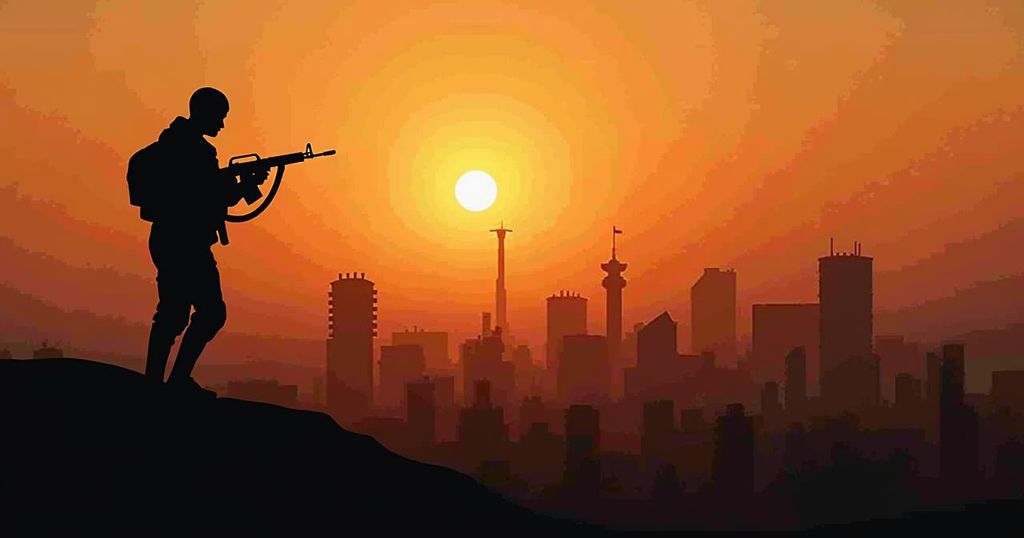Escalating Conflict: Implications of Nasrallah’s Assassination for Iran, Hezbollah, and Israel

The assassination of Hezbollah leader Hassan Nasrallah by Israel escalates tensions in the region, threaten potential wider conflict involving Iran and the U.S. Hezbollah aims to retaliate despite losing leadership and resources. Iran may mobilize allied militias for coordinated strikes against Israel without provoking full-scale war. Israel plans to continue military offensives while potentially preparing for ground operations in Lebanon. The situation is precarious as ongoing actions from each faction will significantly impact the regional stability.
The assassination of Hassan Nasrallah, the long-serving leader of Hezbollah, represents a significant escalation in the ongoing conflict between Israel and the Lebanese militant group. This development heightens concerns of a broader conflict potentially involving Iran and the United States. The unfolding situation hinges on three critical questions regarding the future actions of Hezbollah, Iran, and Israel. Hezbollah is currently facing severe challenges following the loss of its leadership structure, including the assassination of numerous high-ranking commanders. Additionally, its communication infrastructure has been compromised, and it has suffered substantial losses of weaponry due to air strikes. Analyst Mohammed Al-Basha observes that Nasrallah’s death may destabilize Hezbollah, impacting its operational and political strategies in the short term. However, any assumption that this organization will cease hostilities against Israel is likely misguided. Hezbollah has vowed to continue the fight, backed by thousands of fighters, many of whom are seasoned veterans from the Syrian conflict. The group possesses a substantial arsenal of missiles, including precision-guided long-range weapons capable of striking major Israeli cities. There is internal pressure within Hezbollah to retaliate promptly before its capabilities are further diminished. Should Hezbollah launch a mass missile attack, resulting in civilian casualties, Israel’s anticipated response would likely be severe, potentially devastating Lebanon’s infrastructure and possibly extending retaliation towards Iran. Iran, in turn, perceives Nasrallah’s assassination as a significant setback, announcing five days of mourning and taking precautions to safeguard its leader, Ayatollah Ali Khamenei. The Iranian regime has been deliberating its response to prior events, including the assassination of Hamas’s political leader, Ismail Haniyeh. Iran has at its disposal a network of heavily armed militias across the Middle East, known as the “Axis of Resistance,” which includes Hezbollah, the Houthis in Yemen, and various groups in Syria and Iraq. Iran may decide to mobilize these groups to increase their offensive actions against Israel and American interests in the region. Nevertheless, any retaliation is likely to be calibrated to avoid provoking a comprehensive war that Iran cannot effectively contend with. Meanwhile, Israel has made clear its intention to continue military operations despite international calls for a ceasefire. The Israeli military is keen on maintaining the offensive as it assesses that Hezbollah is currently vulnerable. However, achieving the objective of neutralizing the Hezbollah threat may require ground troops to be deployed in Lebanon. The Israeli Defense Forces (IDF) have been conducting infantry training near the border, indicating preparation for possible ground engagement. Notably, Nasrallah previously indicated that an Israeli ground incursion into southern Lebanon would present a “historic opportunity” for Hezbollah to respond. Although entering Lebanon may present tactical advantages for the IDF, the complexities of exiting could replicate the protracted challenges faced in Gaza.
The tensions in the region have escalated due to the intricate relationships between Hezbollah, Israel, and Iran. Hezbollah, a Shiite militant group backed by Iran, has frequently engaged in hostilities with Israel. The recent assassination of its leader is seen as a pivotal moment that could redefine the balance of power in the region. The involvement of Iran, a key ally of Hezbollah, adds another layer of complexity, given its regional ambitions and network of militias. Israel’s military strategy vis-à-vis Hezbollah has historically aimed to neutralize the group’s military capabilities to prevent rocket attacks on Israeli territory.
In summary, the assassination of Hassan Nasrallah marks a significant turning point in the conflict involving Hezbollah, Israel, and Iran. Each party’s subsequent actions will be crucial in determining the trajectory of hostilities in the region. Hezbollah’s vow for continued resistance juxtaposed with Israel’s offensive strategy suggests a potential for escalated conflict. Meanwhile, Iran’s response will likely aim to project strength while avoiding a full-scale war. The situation remains volatile, and the coming days and weeks will be pivotal in shaping the future dynamics of the region.
Original Source: www.bbc.com








